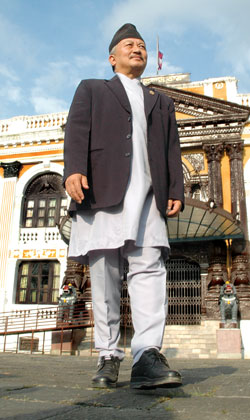|
|
| WALKING TALL: Nepali politics may look hopeless, but house speaker Subhas Nembang, seen here on Tuesday outside parliament, is making progress. |
The interim parliament is sitting regularly again. Electoral bills are being discussed. The government is talking to janajatis and madhesi activists and is nearing agreement on November polls.
After months of deadlock and delays, it looks like everyone is finally focused on ensuring that the constituent assembly doesn't leave anyone out.
"Everyone agrees with the demand for fair representation in the assembly to draft the new constitution. We just have to find the right mechanism," says Speaker Subhas Nembang, whose considerable negotiating skills in the past week have helped bring all sides together.
At the State Affairs Committee on Monday, Minendra Rijal of the NC-D looked tired but happy. Barely 100 m away at the Peace and Reconstruction Ministry, Ram Chandra Paudel was closeted in meetings with the Nepal Adibasi Janajati Federation to discuss proportional representation.
After a meeting with the MJF in Birganj last month, most of the 26 demands of the madhesi activists have been addressed, and MPs stopped obstructing the House after a commission was set up to investigate the tarai incidents and an agreement reached to review demarcation of constituencies.
Even Prime Minister Koirala was upbeat. "This is good," he told janajati activists on Monday in Baluwatar. "If ethnic participation makes democracy stronger, let's negotiate and make it happen."
Janajati and dalit activists are sticking to their demand for full-proportional representation, but they too do not want to make this a reason for another postponement of polls. A constitutional provision to give women 50 percent of the seats under proportional voting and 33 percent in the first-past-the-post ballot is seen as a model. Dalits are generally satisfied with their 14 percent, but are angling for another six percent. If constituencies are delineated on the basis of population, madhesi activists say they will be satisfied.
The one-ethnicity-one seat demand of the janajatis and a plus-minus 10 percent leeway for parties in their closed lists are stumbling blocks. But both sides have decided to study the issue in detail and negotiate again. Says Rijal: "We have to find a middle ground between the needs of the parties and the demands of the ethnicities."
In an ideal world, all elections should have proportional representation, and even the first-past-the-post voting lists should be proportional. A way out could be to get the parties to set aside seats for ethnicities just as they have agreed to have 33 percent women in the voting lists.
To be sure, negotiators are now getting to the core issues of representation that challenge the status quo. But if the past two weeks in the meeting rooms of parliament are anything to go by, there is now strong political will to move forward.



